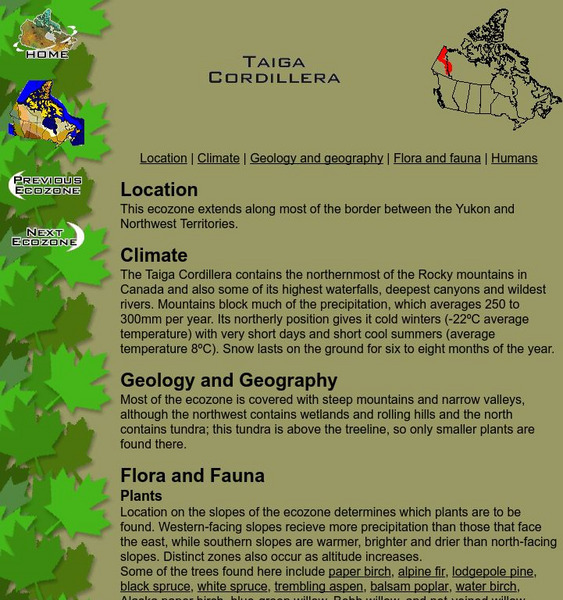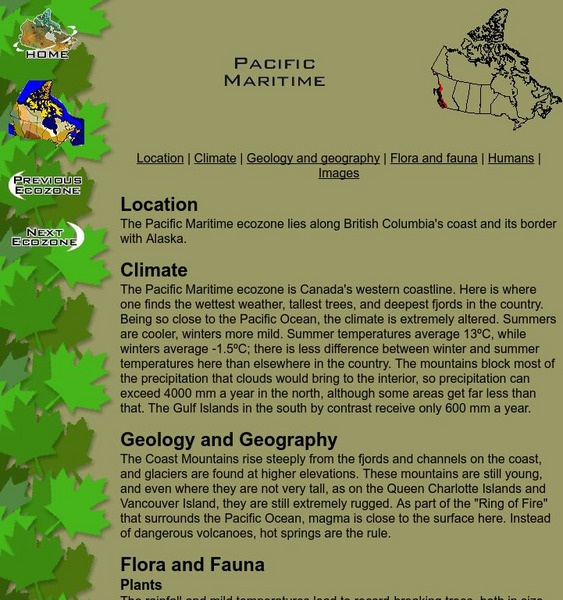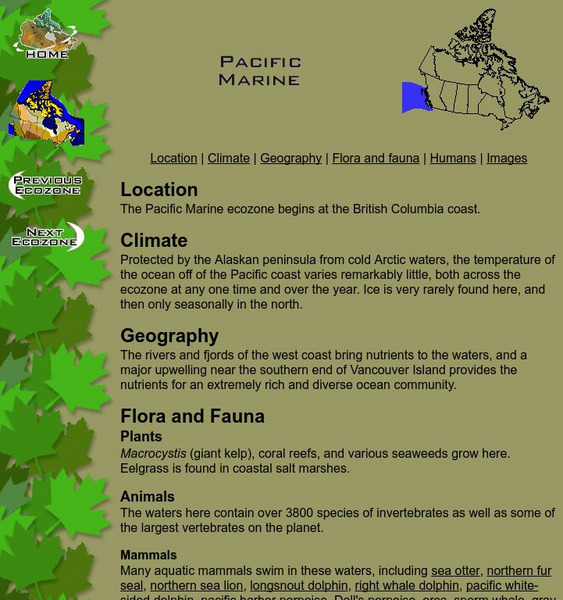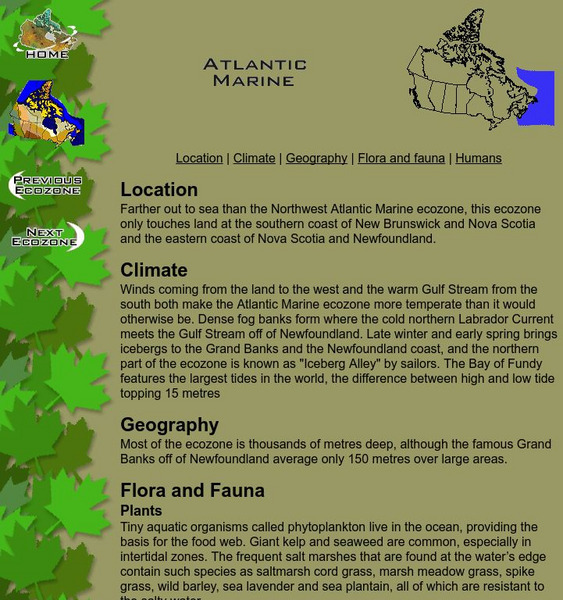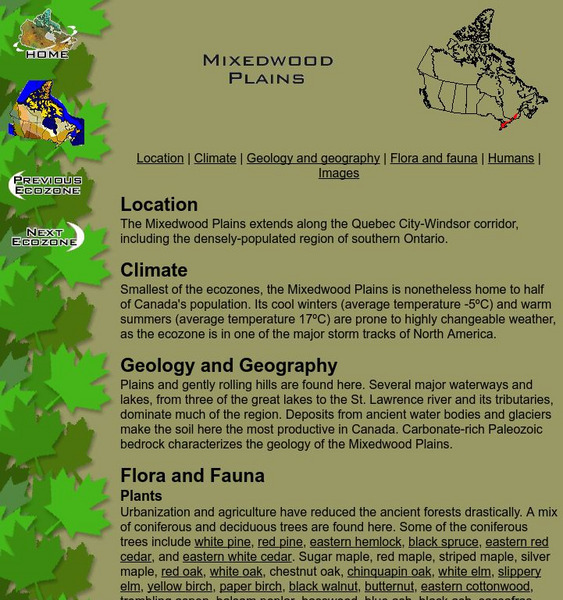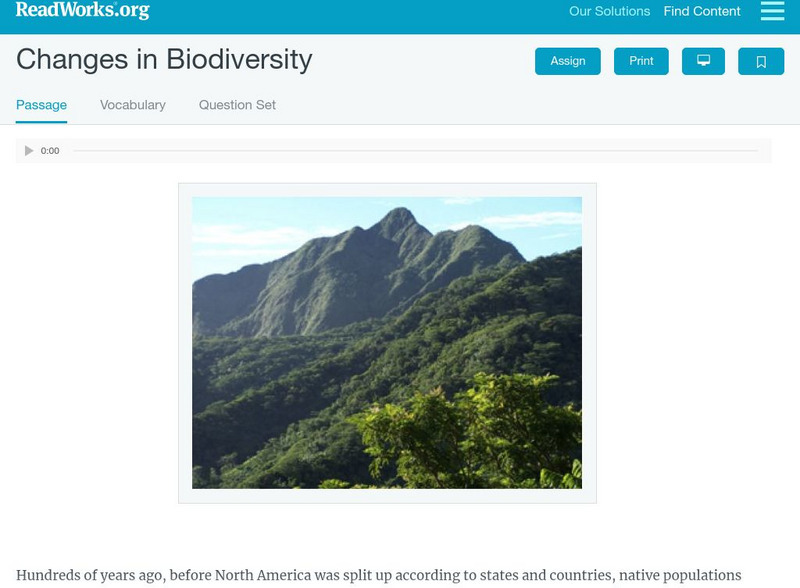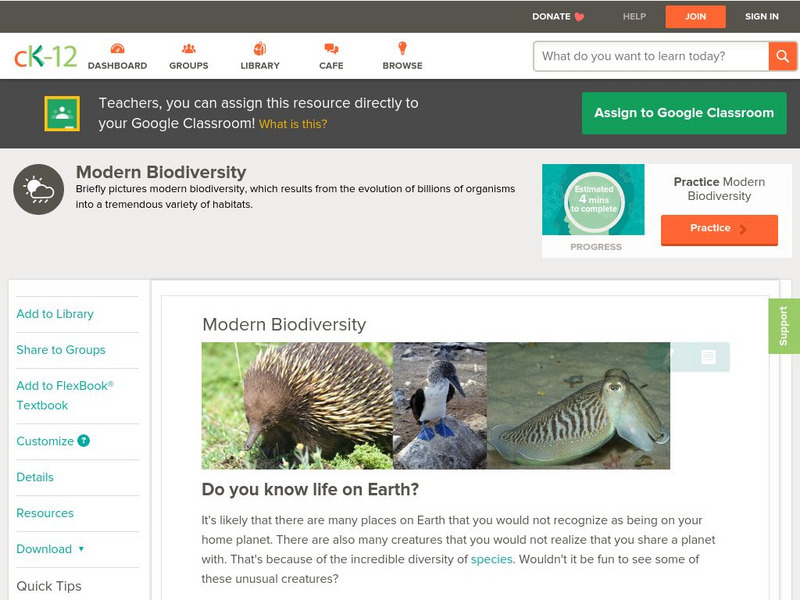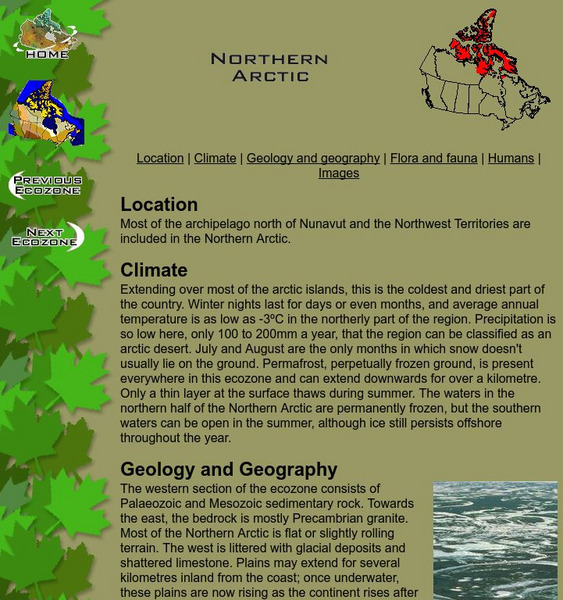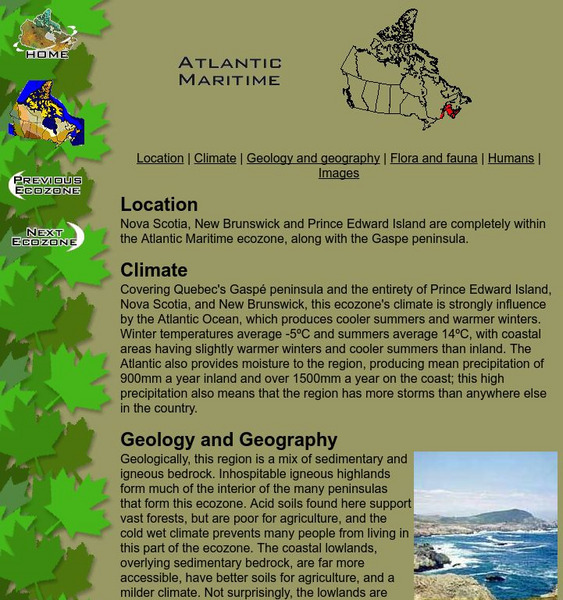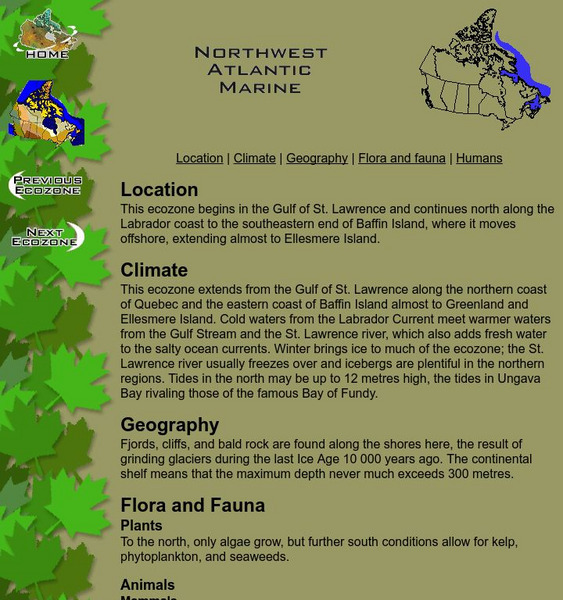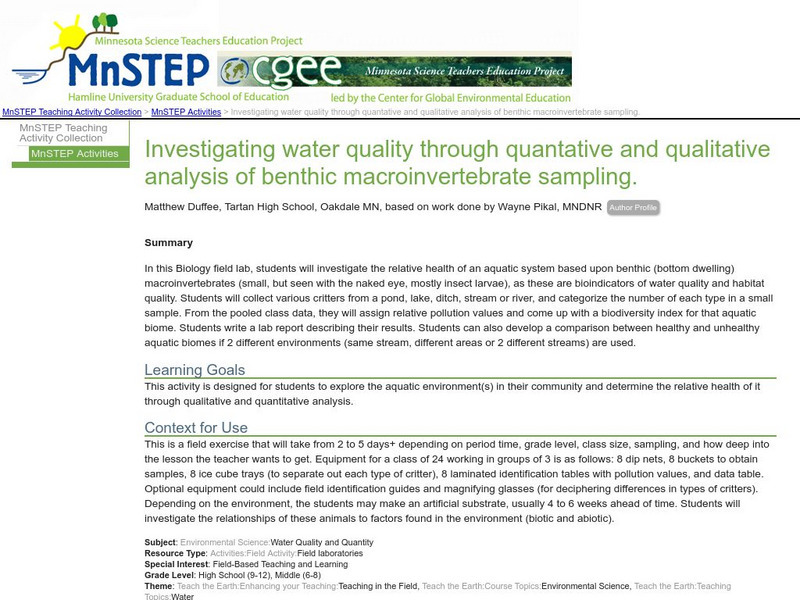McGill University
Mc Gill University: Canadian Biodiversity: Ecozones: Taiga Cordillera
The Taiga Cordillera extends along the border of the Yukon and Northwest Territories. This is a brief, concise description of the location, climate, geology and flora and fauna. It includes a collection of images of the landscape as well...
McGill University
Mc Gill University: Canadian Biodiversity: Ecozones: Pacific Maritime
The Pacific Maritime ecozone lies along the British Columbia coast and it's border with Alaska. This is a brief, concise description of the location, climate, geology and flora and fauna. It includes a collection of images of the...
McGill University
Mc Gill University: Canadian Biodiversity: Ecozones: Pacific Marine
The Pacific Marine ecozone begins at the British Columbia Coast. This is a brief, concise description of the location, climate, geology and flora and fauna. It includes some images of the animals and birds native to the location. Many of...
McGill University
Mc Gill University: Canadian Biodiversity: Ecozones: Atlantic Marine
The Atlantic Marine ecozone is located father out to sea and touches land at the southern coast of New Brunswick and Nova Scotia and the eastern coast of Nova Scotia and Newfoundland. This brief, concise description includes a collection...
McGill University
Mc Gill University: Canadian Biodiversity: Ecozones: Mixedwood Plains
This Mixedwood Plains ecozone extends along the Quebec City- Windsor corridor and the densely-populated region of Southern Ontario. This brief, concise description includes a collection of images of the animals and birds native to the...
The Franklin Institute
Franklin Institute: Ecosystems, Biomes, and Habitats
This site is provided for by The Franklin Institute Online. "Open the door and step into your ecosystem." Content describes ecosystems and related material such as biomes, habitats, energy cycle, extinction, recycling, and more.
Other
Welcome to Biodiversity Hotspots
Conservation International offers this extensive look at some of earth's most vulnerable areas. Some of the most remarkably diverse places in the world also prove to be some of the most threatened. Learn more about the efforts in place...
Other
Alberta Riparian Habitat Mgt Society: Biodiversity and Riparian Areas [Pdf]
Healthy riparian areas have much higher levels of biodiversity than other types of ecosystems, as explained in this fact sheet. Unfortunately, this also attracts more people, which can contribute to degradation of the ecosystem if the...
Read Works
Read Works: Changes in Biodiversity
[Free Registration/Login Required] An informational text about changes in biodiversity and the chain reaction of problems they can cause. A question sheet is available to help students build skills in reading comprehension.
Ducksters
Ducksters: Science for Kids: World Biomes and Ecosystems
Kids learn about the world's biomes and ecosystems. The network of life and biodiversity needed for all to survive.
CK-12 Foundation
Ck 12: Earth Science: Modern Biodiversity
[Free Registration/Login may be required to access all resource tools.] How diverse Earth's organisms are today.
CK-12 Foundation
Ck 12: Earth Science: Modern Biodiversity
[Free Registration/Login may be required to access all resource tools.] How diverse Earth's organisms are today.
Science Education Resource Center at Carleton College
Serc: Using Benthic Marcoinvertebrates to Determine Biodiversity in a River
For this investigation of macroinvertebrates, students will build rock baskets and place them in various parts of a river to collect insects. Students will group insects according to their pollution tolerance and use the PTI to determine...
McGill University
Mc Gill University: Canadian Biodiversity: Ecozones: Northern Arctic
A brief, concise description of the chain of islands that form most of the archipelago north of Nunavut and the Northwest Territories. It includes an excellent collection of images of the landscape as well as those of animals and birds...
McGill University
Mc Gill University: Canadian Biodiversity: Ecozones: Atlantic Maritime
This Atlantic Maritime ecozone includes Nova Scotia, New Brunswick, and Prince Edward Island. This brief, concise description includes a collection of images of the animals and birds native to the location. Many of the images include...
McGill University
Mc Gill University: Canadian Biodiversity: Ecozones: Northwest Atlantic Marine
The Northwest Atlantic Marine ecozone begins in the Gulf of St. Lawrence and extends to the southeastern end of Baffin Island. This is a brief, concise description of the location, climate, geology, and flora and fauna. It includes some...
Center for Educational Technologies
Nasa Classroom of the Future: Exploring the Environment: Tropical Poison
An educational module on biodiversity, economic growth, and medical research in rainforests. This can be used by students or teachers. It has a huge amount of information on agriculture, biodiversity, medicinal plants, animals, and more.
University of California
Ucmp: The World's Biomes
The University of California Museum of Paleontology hosts this site devoted to the study of the earth's biomes, which are the world's major communities, classified according to the predominant vegetation and adaptations of organisms to...
Science Education Resource Center at Carleton College
Serc: Investigating Water Quality Through Quantative and Qualitative Analysis
By looking at the bottom dwelling macroinvertebrates, students will investigate water quality and habitat quality in this field lab. Students will record the number of creatures found at the bottom of a pond, lake, ditch, stream or river...
PBS
Pbs: Plum Landing
Invite students to visit ecosystems around the world with this collection. This collection includes activities for the classroom, after school, and families. Also included is games.
McGill University
Mc Gill University: Canadian Biodiversity: Ecozones: Boreal Cordillera
This Boreal Cordillera contains the mountains of the southern Yukon and northern British Columbia . This brief, concise description includes a collection of images of the animals and birds native to the location. Many of the images...
McGill University
Mc Gill University: Canadian Biodiversity: Ecozones: Montane Cordillera
The Montane Cordillera covers most of southern British Columbia and some of southwestern Alberta. This is a brief, concise description of the location, climate, geology and flora and fauna. It includes an excellent collection of images...
McGill University
Mc Gill University: Canadian Biodiversity: Ecozones: Boreal Shield
The Boreal Shield runs from Alberta to Newfoundland. This is a brief, concise description of the location, climate, geology and flora and fauna. It includes a collection of images of the landscape as well as those of animals and birds...
OneWorld UK
One World: Stop Life in Danger
Elementary students will appreciate the cartoon style fact clips as the evolution of life on earth is laid out. Diversity, survival of the fittest, and ideas to help the environment are all included. An entertaining site for younger...


